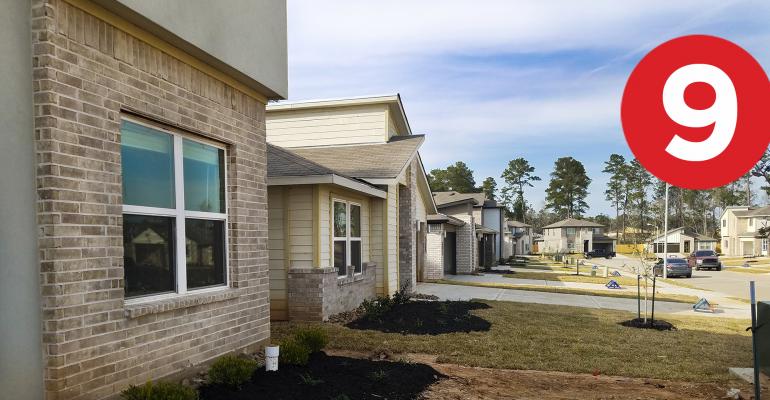- Home Building Bypassing Individual Homebuyers for Deep-Pocketed Investors “Investors who buy and then rent new homes are fast becoming a favorite customer of the home builder industry. The vast majority of the hundreds of thousands of new homes built last year were sold to individuals and families to live in. But rising mortgage rates are making those purchases much more expensive and could lead to a pullback in demand by those traditional buyers. However, investors holding billions of dollars are eager to buy these homes in bulk, a boon to home builders who have increased construction in recent months.” (The Wall Street Journal)
- Fear of High Inflation Has CRE Scrambling to Predict the Fallout “The specter of inflation, and rising interest rates, casts a dark cloud of uncertainty over the market at large. In mid-March, the Federal Reserve approved a 25-basis-point increase in its benchmark federal funds rate to try to curb the escalation. It also penciled in additional increases, expecting to hit 2 percent by the end of the year and 2.75 percent by the end of 2023. These are levels not seen since the Great Recession and enough to fuel comparisons to the late 1970s and early 1980s, the last time interest rates hit double-digit percentages, also amid an attempt to rein in ballooning inflation.” (Commercial Observer)
- Waiting for More Data on the Office Sector “By some measures, the office sector seems to have improved some, according to a new report from Colliers. However, questions remain, and arise, about where the market might be headed. Last year closed out with some positive news, according to Colliers. For example, the Q1 2022 office vacancy rate stands at 14.8%, down from 14.9% in the fourth quarter of 2021. The amount of sublease space has fallen to 199.7 million square feet.” (GlobeSt.com)
- As Remote Work Becomes Permanent, Can Manhattan Adapt? “PwC, a global consulting firm with its American headquarters in New York City, has told 40,000 of its United States employees that they can work remotely forever. Quinn Emanuel Urquhart & Sullivan, a white-shoe law firm with about 300 lawyers in New York, is allowing its staff to live anywhere in the country. Verizon, which is headquartered in New York, has started permitting hybrid employees to come to the office as many, or as few, days a week as they want.” (The New York Times)
- Demand Increases for Short-Term Net Leases “Since the beginning of the year, more institutional and private equity players have been seeking net-lease deals with shorter terms, according to a State of the Industry panel at GlobeSt’s Net Lease Spring conference. But panelists cautioned that short-term deals are best suited to high-demand assets in prime locations, including industrial and multifamily properties, where substantial rent increases and rising inflation can be baked into the deal to allow owners to recoup the cost.” (GlobeSt.com)
- How COVID Forever Changed the Future of Fast-Food Design “Matthew Walls has a confession. For years, CKE Restaurants, the parent company of the well-known Carl’s Jr. and Hardee’s quick-service brands, built the restaurants it wanted to build. While consumers were certainly considered, stores were largely designed and constructed to meet the company’s purposes. But that philosophy ends this summer with the debut of a new Hardee’s restaurant prototype in Nolensville, Tennessee. At 2,500 square feet, the upcoming unit shrinks the traditional Hardee’s footprint more than 25 percent, while 22 interior seats come in well below the norm.” (QSR Magazine)
- Wooden Skyscrapers Are on the Rise “Guests at a new 20-story hotel and cultural center in Skellefteå, a former gold-mining community in northeastern Sweden, don’t have to step outside to feel immersed in the natural world. The floors, ceilings and support beams of the building—which also houses a museum and other facilities—are made almost entirely of spruce and pine harvested from nearby woodlands.” (The Wall Street Journal)
- Philadelphia’s COVID-19 Mask Mandate Could Go Back into Effect: Officials “Health Commissioner Dr. Cheryl Bettigole said mask precautions begin Monday, but in order to provide a one-week education period for businesses, masks will be required in all indoor public spaces as of Monday, April 18. Starting April 18, masks will be required in all indoor public spaces, including schools and child care settings, businesses, restaurants, and government buildings. At that time, residents will be asked to report any business not complying with the mandate to 311.” (ABC Action News)
- Once a Retail Giant, Kmart Nears Extinction After Closure “The familiar sights and sounds are still there: the scuffed and faded floor tiles, the relentless beige-on-beige color scheme, the toddlers’ clothes and refrigerators and pretty much everything in between. There’s even a canned recording that begins, ‘Attention, Kmart shoppers’ — except it’s to remind folks about COVID-19 precautions, not to alert them to a flash sale over in ladies’ lingerie like days of old.” (The Associated Press)
0 comments
Hide comments





